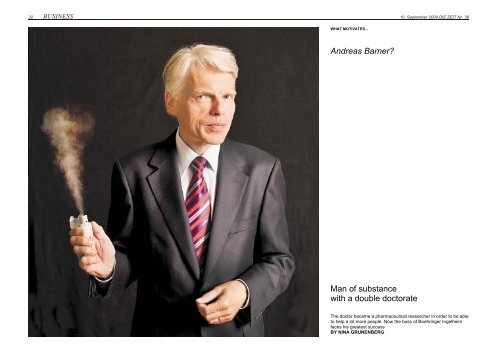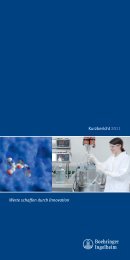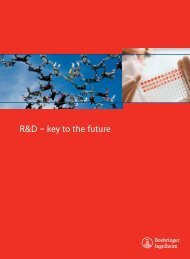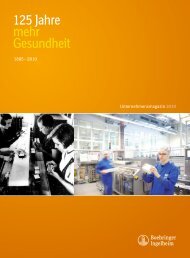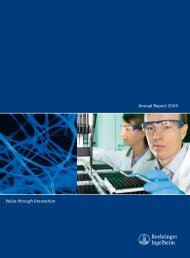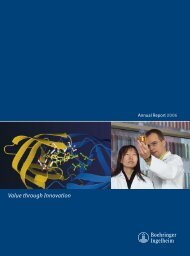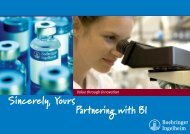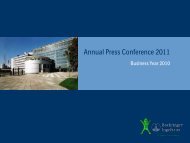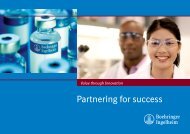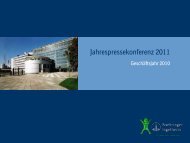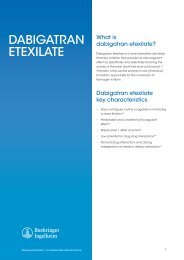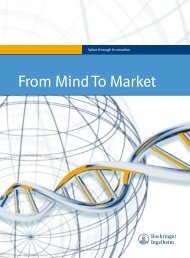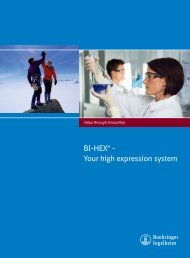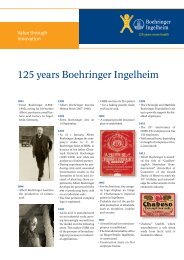Andreas Barner? Man of substance with a ... - Boehringer Ingelheim
Andreas Barner? Man of substance with a ... - Boehringer Ingelheim
Andreas Barner? Man of substance with a ... - Boehringer Ingelheim
Create successful ePaper yourself
Turn your PDF publications into a flip-book with our unique Google optimized e-Paper software.
32 BUSINESS 10. September 2009 DIE ZEIT Nr. 38<br />
WHAT MOTIVATES...<br />
<strong>Andreas</strong> <strong>Barner</strong>?<br />
<strong>Man</strong> <strong>of</strong> <strong>substance</strong><br />
<strong>with</strong> a double doctorate<br />
The doctor became a pharmaceutical researcher in order to be able<br />
to help a lot more people. Now the boss <strong>of</strong> <strong>Boehringer</strong> <strong>Ingelheim</strong><br />
faces his greatest success<br />
BY NINA GRUNENBERG
ugust 30 was something <strong>of</strong> a fateful day for<br />
<strong>Boehringer</strong>. From the standpoint <strong>of</strong> the familyowned<br />
company it <strong>of</strong>fered two options: It could<br />
have been a "black Sunday", or a Sunday on<br />
which pharmaceutical innovative strength was<br />
proclaimed in glowing terms. In any case, this<br />
day would decide the company's future for the<br />
next ten years.<br />
This was the day on which the results <strong>of</strong> a study<br />
investigating the active <strong>substance</strong> dabigatran in<br />
stroke prophylaxis in patients <strong>with</strong> atrial<br />
fibrillation were presented at the European<br />
Congress <strong>of</strong> Cardiology in Barcelona and<br />
concurrently published in the New England<br />
Journal <strong>of</strong> Medicine.<br />
An appropriate treatment that would be easier to<br />
manage than Marcumar [phenprocoumon] and<br />
associated <strong>with</strong> fewer risky complications had<br />
been lacking until now. Researchers across the<br />
globe had been trying to find out how blood<br />
clotting could be influenced in a more<br />
benevolent way. <strong>Boehringer</strong> <strong>Ingelheim</strong> had been<br />
working particularly hard on this issue.<br />
<strong>Andreas</strong> <strong>Barner</strong>, the boss - although he should<br />
not really be called that because it conflicts <strong>with</strong><br />
the company's philosophy - says: "It was<br />
perfectly clear that such a drug would be<br />
medically important, but that its effects would<br />
need to be confirmed in a large-scale clinical<br />
study, the results <strong>of</strong> which would only emerge at<br />
the every end."<br />
This study involved some 18,000 patients in 44<br />
countries and cost the company over 200 million<br />
euros, a huge sum. "And all the time you're<br />
wondering: Will the concept work? Is the drug<br />
well tolerated, or will it be a disappointment for<br />
the company?" It would not be the first time that<br />
a preparation failed at the last hurdle.<br />
"I love research and I am delighted by its<br />
complexity"<br />
A lot was at stake, but the outcome was clear:<br />
The investment paid <strong>of</strong>f. The <strong>Boehringer</strong><br />
scientists had achieved a medical breakthrough,<br />
as confirmed by the cardiologists in Barcelona:<br />
"For the first time in 50 years a new bloodthinning<br />
agent had been developed that proved<br />
to be safer and more effective than the existing<br />
treatments". According to one conference<br />
participant: "The result was a bombshell."<br />
The application for the marketing authorisation<br />
<strong>of</strong> Pradaxa (the brand name <strong>of</strong> the future drug)<br />
is to be submitted in the Autumn. The<br />
preparation has every chance <strong>of</strong> becoming a<br />
bestseller – <strong>Boehringer</strong>'s next "blockbuster", the<br />
term the drugs sector uses to refer to drugs <strong>with</strong><br />
annual sales in excess <strong>of</strong> a billion dollars.<br />
<strong>Andreas</strong> <strong>Barner</strong> is not just hoping for pr<strong>of</strong>its. He<br />
is primarily concerned <strong>with</strong> new treatments<br />
"which naturally occur only rarely, and very<br />
rarely on the scale observed for this drug".<br />
<strong>Barner</strong>, 56, has been the Chairman <strong>of</strong> the Board<br />
<strong>of</strong> <strong>Boehringer</strong> <strong>Ingelheim</strong> since the start <strong>of</strong> this<br />
In the family<br />
With annual sales <strong>of</strong> 11.6 billion euros,<br />
<strong>Boehringer</strong> <strong>Ingelheim</strong> is the world's<br />
largest research-based pharmaceutical<br />
company that remains wholly in family<br />
ownership. Among German companies,<br />
only the publicly listed Bayer AG is larger.<br />
Business at the internationally-operating<br />
<strong>Boehringer</strong> Group, which employs a<br />
workforce <strong>of</strong> around 12,000 in Germany<br />
and 41,300 worldwide, is good. In the past<br />
year, the company posted a net pr<strong>of</strong>it <strong>of</strong><br />
1.4 billion euros. The return on equity is<br />
no less than 42 percent.<br />
The Shareholders' Committee, which<br />
represents the owning families <strong>of</strong><br />
<strong>Boehringer</strong> and von Baumbach, has<br />
been chaired since 2007 by the business<br />
management graduate Christian<br />
<strong>Boehringer</strong> (photo). He is a greatgrandson<br />
<strong>of</strong> the company founder, who<br />
started a tartar factory in 1885 in<br />
<strong>Ingelheim</strong> am Rhein. While the head<br />
<strong>of</strong>fice and production facilities are located<br />
in <strong>Ingelheim</strong>, the largest research campus<br />
is in Biberach in Baden-Württemberg<br />
(photo below). Biberach is also the site <strong>of</strong><br />
the Biotechnikum, one <strong>of</strong> the largest cell<br />
culture production facilities in Europe. In<br />
Hanover, which is also a successful site<br />
<strong>with</strong> its animal vaccines, the company<br />
plans to set up a research centre, despite<br />
the protests <strong>of</strong> local residents and animalrights<br />
activists.<br />
year and is additionally responsible for research,<br />
development and medicine – according to the<br />
company's articles <strong>of</strong> association one <strong>of</strong> four<br />
equal members <strong>of</strong> the company management.<br />
Egotistical CEOs are not part <strong>of</strong> the corporate<br />
culture. The management style focuses on<br />
consensus and collegiality and is coordinated<br />
relatively closely <strong>with</strong> the managing<br />
shareholders.<br />
This suits a man like <strong>Barner</strong> who seeks out the<br />
intellectual challenges in basic research and is<br />
motivated by the associated complex hidden<br />
opportunities. "I love research", he once said,<br />
"and I am delighted by its complexity."<br />
When he joined <strong>Boehringer</strong> in 1992 he had not<br />
yet celebrated his fortieth birthday. He had<br />
studied medicine in Freiburg and mathematics at<br />
the Swiss Federal Institute <strong>of</strong> Technology in<br />
Zurich, obtaining doctorates in both these<br />
subjects. After working for a year as a junior<br />
doctor, he switched to the pharmaceutical sector<br />
and worked in research at what was then Ciba-<br />
Geigy AG in Basel.<br />
What was such a brilliant individual looking for in<br />
an industry whose infamous sales methods were<br />
repeatedly in the headlines?<br />
<strong>Barner</strong> viewed the pharmaceutical sector from a<br />
different perspective. His motivation was to help<br />
people in need. "As a doctor you are working for<br />
individual people", he states. "In the<br />
pharmaceutical industry you can achieve<br />
something for many people at the same time.<br />
And once you have decided to enter<br />
pharmaceutical research, you are involved in<br />
collective medicine for large numbers <strong>of</strong> people<br />
and are hoping for just one thing – that you will<br />
succeed in making a difference in patients'<br />
lives."<br />
He believes that such an opportunity may arise<br />
just once or twice in a pr<strong>of</strong>essional career, and<br />
considers Pradaxa to be one such breakthrough.<br />
The HIV drug Viramune was another hit, that<br />
satisfied his high ethical standards. "The virus<br />
was discovered in 1985, and the mortality rate<br />
was huge, <strong>with</strong> 90 to 95 percent <strong>of</strong> patients<br />
dying <strong>with</strong>in a short period. While it is still a<br />
serious illness, it has now become a chronic<br />
condition. This is one contribution made by the<br />
German industry, and I am pleased that we as a<br />
company were part <strong>of</strong> the solution."<br />
<strong>Andreas</strong> <strong>Barner</strong>, who is also a member <strong>of</strong> the<br />
executive board <strong>of</strong> the German Protestant<br />
Kirchentag [church congress], is not preceded<br />
by a bow wave <strong>of</strong> importance when he enters a<br />
room. He is <strong>of</strong> delicate build, modest and<br />
charming and talks quietly. He has been a<br />
member <strong>of</strong> the Science Council for a year and<br />
has impressed the pr<strong>of</strong>essors <strong>with</strong> the breadth<br />
<strong>of</strong> his knowledge, awareness <strong>of</strong> the problems in<br />
research, but above all <strong>with</strong> "his uncanny<br />
timing", according to Council Chairman Peter<br />
Strohschneider. When a discussion has lost its<br />
way, he joins in and takes control shortly before<br />
it ends in total confusion, bringing it back on<br />
track <strong>with</strong> a thoughtful word or two.<br />
He is experienced in the game <strong>of</strong> remaining<br />
calm in the face <strong>of</strong> the uncertainties that crop up<br />
in basic research and maintaining the overview<br />
and defending justified hope. Convincing his<br />
staff, not to mention the owners, that the<br />
investment is paying <strong>of</strong>f is his daily bread and<br />
butter. "The risk that we are taking must be<br />
clearly defined <strong>with</strong>in the company. It is very<br />
important to state openly just how great or small<br />
you assess the risk to be. The staff must be<br />
aware <strong>of</strong> this." He makes his own assessment<br />
primarily by "listening to everyone who has<br />
something intelligent to say. That helps."<br />
"You are now the conscience <strong>of</strong> the<br />
company"<br />
In the Development Committee that he chairs he<br />
alone takes the final decision, but he does not<br />
do this secluded from everyone else and away<br />
from the laboratories, but retains the connection<br />
<strong>with</strong> the project teams. "We can bypass all the<br />
hierarchy levels in order to listen to those who<br />
are most familiar <strong>with</strong> a subject. This improves<br />
the quality <strong>of</strong> the decisions, but it's also hard<br />
work. Reading the documents prepared by a<br />
project team is hard graft, but I believe it is the<br />
right way <strong>of</strong> keeping abreast <strong>of</strong> the situation."<br />
The programme up until 2015 has been set. The<br />
next target year will be 2020. At <strong>Boehringer</strong> they<br />
think in five-year strategy cycles because, after<br />
all, live continues beyond the next quarterly<br />
statement. <strong>Andreas</strong> <strong>Barner</strong> even prefers to think<br />
in 25-year generations, which corresponds to<br />
the units <strong>of</strong> time <strong>of</strong> the founding family, which<br />
has owned the company for over a hundred<br />
years - now in the fourth generation.<br />
Only half-jokingly, <strong>Barner</strong> explains that, in his<br />
opinion, pharmaceutical companies thrive best<br />
under family ownership - <strong>with</strong>out investors,<br />
<strong>with</strong>out shareholders and <strong>with</strong>out financial<br />
market analysts, people who tend not to take the<br />
long view. "Anyone who decides to set up a new<br />
research-based company now can expect to<br />
wait four to eight years, depending on how much<br />
basic research he carries out, until he obtains a<br />
<strong>substance</strong> that promises what he expected from<br />
the original research idea. From synthesis to<br />
market maturity then involves, on average,<br />
twelve years <strong>of</strong> development. So that makes 16<br />
to 20 years. If you then consider how long a<br />
preparation takes to be registered and become<br />
relatively successful you can add a further four<br />
or five years. In the end you have taken 25<br />
years - a whole generation, just like in a familyowned<br />
company."<br />
When you visit <strong>Boehringer</strong> in <strong>Ingelheim</strong> you<br />
have the impression <strong>of</strong> being in an alternative<br />
world – far removed from all that we know <strong>of</strong> the<br />
megalomania <strong>of</strong> the Schaefflers, Piëchs and<br />
Porsches, but also not to be compared <strong>with</strong><br />
publicly listed pharmaceutical companies, which<br />
sometimes hardly have the courage to do<br />
research because the risk is too great.<br />
In the four-member Shareholders' Committee,<br />
which also acts as a kind <strong>of</strong> supervisory board, a<br />
cohort <strong>of</strong> 40-year-olds currently has overall<br />
2<br />
responsibility. They are reported to see<br />
themselves as trustees for their children, and<br />
are determined to augment their legacy while<br />
remaining true to the values <strong>of</strong> their forebears,<br />
namely "to serve society through research and<br />
the manufacture <strong>of</strong> new medicines".<br />
Can this be true? <strong>Boehringer</strong> is extremely well<br />
financed. The company has no debts, but rather<br />
three billion euros in the bank, and is one <strong>of</strong> the<br />
most pr<strong>of</strong>itable in Germany. It occupies 15th<br />
place in the world's 20 largest pharmaceutical<br />
companies and is the only family-owned firm in<br />
this group.<br />
In public <strong>Boehringer</strong> moves so discreetly that,<br />
just 15 years ago, some were hardly aware <strong>of</strong><br />
the company's existence. This pr<strong>of</strong>ile was in line<br />
<strong>with</strong> the history <strong>of</strong> each family member, who<br />
would be kept informed <strong>of</strong> the company's<br />
business in silence and <strong>with</strong> closed eyes. The<br />
secretary would then deliver the decisions to the<br />
Board.<br />
While this may have shown style, at the start <strong>of</strong><br />
the nineties it could no longer be denied that the<br />
number <strong>of</strong> patents had dwindled and the<br />
"pipeline" was running out. The family realised<br />
that the old business model was no longer<br />
working. They set themselves new goals,<br />
focused more on specific drug groups and<br />
appointed <strong>Andreas</strong> <strong>Barner</strong> as the Head <strong>of</strong><br />
Clinical Research. The family had finally<br />
decided: "Now we have time for research". The<br />
researchers simply had to say what they<br />
needed. Would an investor have shown so much<br />
blind faith? The then Chairman <strong>of</strong> the<br />
Shareholders' Committee, Erich von Baumbach,<br />
sent <strong>Barner</strong> on his way <strong>with</strong> the words: "You are<br />
now the conscience <strong>of</strong> the company."<br />
Ten years after this reorientation, success<br />
returned. In 2002 <strong>Boehringer</strong> launched a new<br />
drug for treating chronic respiratory symptoms,<br />
the company's first blockbuster. <strong>Andreas</strong> <strong>Barner</strong><br />
is happy to be photographed <strong>with</strong> the Spiriva<br />
inhaler. It is one <strong>of</strong> the drugs that make a<br />
difference to patients' lives, one <strong>of</strong> his key<br />
requirements.<br />
He believes it is important that companies<br />
should "focus strongly on the medical needs.<br />
That's why we are carrying out research on HIV,<br />
strokes and Alzheimer's, and why we entered<br />
the field <strong>of</strong> oncology a few years ago. The<br />
convincing answer that we are able to give, is<br />
that the results generally prove pr<strong>of</strong>itable."<br />
A reporter on the Frankfurter Allgemeine Zeitung<br />
recently regretted the fact that it was not<br />
possible to buy shares in <strong>Boehringer</strong>, a<br />
company "on which the sun shines". But would<br />
that benefit the culture <strong>of</strong> the company?<br />
Preventing any harm to this culture is one <strong>of</strong><br />
<strong>Barner</strong>'s declared top priorities.<br />
As a man who is looking to make a difference,<br />
his ideas go in another direction. Germany was<br />
once the "pharmacy <strong>of</strong> the world", and has now<br />
lost this title. But might it be able to win it back<br />
again? "Germany is expensive, but the<br />
academic research is really good. We therefore<br />
need to work hard to ensure that we are at least<br />
back on a rising curve."


